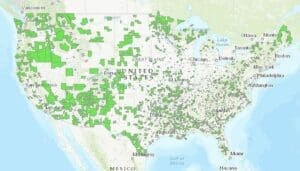 I read an interesting article this week about food deserts. For those that don’t know, a food desert is an area that has limited access to affordable and nutritious food. On the other end of the spectrum is a food oasis, which has higher access to supermarkets or vegetable shops with fresh foods. In 2010, the United States Department of Agriculture (USDA) reported that 23.5 million Americans live in food deserts, meaning that they live more than one mile from a supermarket in urban or suburban areas, and more than 10 miles from a supermarket in rural areas. Often times, these deserts are in lower income areas. For those residents, they may not have a car, and the thought of riding public transportation with multiple bags of groceries is unappealing. Ride-sharing company Lyft is looking to help solve this problem. For its Grocery Access program, Lyft has teamed up with grocers and nonprofits in a dozen cities to make fresh groceries more accessible. Those living in specific neighborhoods deemed as food deserts can get a discounted ride to a participating grocer. Lyft reports that in Washington, D.C., where the program ran in early 2019, some 400 families took more than 5,000 Lyft rides to grocers over six months — and cut the amount of shopping commuting time in half. And now on to this week’s logistics news.
I read an interesting article this week about food deserts. For those that don’t know, a food desert is an area that has limited access to affordable and nutritious food. On the other end of the spectrum is a food oasis, which has higher access to supermarkets or vegetable shops with fresh foods. In 2010, the United States Department of Agriculture (USDA) reported that 23.5 million Americans live in food deserts, meaning that they live more than one mile from a supermarket in urban or suburban areas, and more than 10 miles from a supermarket in rural areas. Often times, these deserts are in lower income areas. For those residents, they may not have a car, and the thought of riding public transportation with multiple bags of groceries is unappealing. Ride-sharing company Lyft is looking to help solve this problem. For its Grocery Access program, Lyft has teamed up with grocers and nonprofits in a dozen cities to make fresh groceries more accessible. Those living in specific neighborhoods deemed as food deserts can get a discounted ride to a participating grocer. Lyft reports that in Washington, D.C., where the program ran in early 2019, some 400 families took more than 5,000 Lyft rides to grocers over six months — and cut the amount of shopping commuting time in half. And now on to this week’s logistics news.
- FAA to begin certification process for civilian drones in US
- Unilever to deliver ice cream via drones
- UPS unveils modernization initiatives
- IKEA’s meatball supply chain goes digital
- Ryder expands truck-sharing program COOP
- Virgin joins Air France-KLM-Delta transatlantic cargo JV
- 16 Chinese ports offer reduced charges
- Georgia planning first-in-nation truck-only interstate lanes
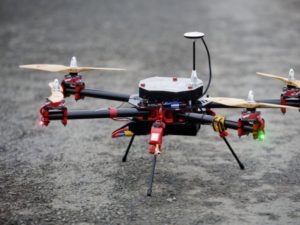 The Federal Aviation Administration (FAA) has announced that it is seeking comment from the public and the drone industry for how to determine whether a drone is safe. Regulators will begin to review drone designs in the same way that other aircraft is reviewed. Many people see this as a step in the right direction to allow drones to make home deliveries. While current regulations allow hobbyists and commercial drone operators to fly, the restrictions on the use of drones has made home deliveries nearly impossible. According to the FAA, as the policy is reworked, the devices “affected by this policy will include those used for package delivery.” Companies are currently participating in FAA-sanctioned tests of how to make deliveries of consumer goods and medical supplies by drone, but these require special approvals for tests. The agency will accept comments for 30 days.
The Federal Aviation Administration (FAA) has announced that it is seeking comment from the public and the drone industry for how to determine whether a drone is safe. Regulators will begin to review drone designs in the same way that other aircraft is reviewed. Many people see this as a step in the right direction to allow drones to make home deliveries. While current regulations allow hobbyists and commercial drone operators to fly, the restrictions on the use of drones has made home deliveries nearly impossible. According to the FAA, as the policy is reworked, the devices “affected by this policy will include those used for package delivery.” Companies are currently participating in FAA-sanctioned tests of how to make deliveries of consumer goods and medical supplies by drone, but these require special approvals for tests. The agency will accept comments for 30 days.
 Unilever is teaming up with TerraDrone Europe to make drone deliveries of Ben & Jerry’s ice cream in New York City. The program is part of Unilever’s ice cream delivery service Ice Cream Now, which was launched in 2017. During a recent demonstration, Unilever used a multi-copter drone equipped with a delivery box that can hold 3 Ben & Jerry’s mini cups. The flight traveled over a pre-determined path through Unilever’s facility. According to Terra Drone Europe, with regulations around future drone flights expected to become more flexible, Unilever is preparing for a drone logistics service that will deliver products to more customers across the country.
Unilever is teaming up with TerraDrone Europe to make drone deliveries of Ben & Jerry’s ice cream in New York City. The program is part of Unilever’s ice cream delivery service Ice Cream Now, which was launched in 2017. During a recent demonstration, Unilever used a multi-copter drone equipped with a delivery box that can hold 3 Ben & Jerry’s mini cups. The flight traveled over a pre-determined path through Unilever’s facility. According to Terra Drone Europe, with regulations around future drone flights expected to become more flexible, Unilever is preparing for a drone logistics service that will deliver products to more customers across the country.
 Speaking of drones, UPS is expanding its drone operations in the healthcare sector. Last year, the company formed a subsidiary drone business, UPS Flight Forward, and received a highly-restricted air carrier certification from the FAA. UPS will test drone delivery use cases with Henry Schein, a worldwide distributor of medical and dental supplies. This is just one initiative in the company’s efforts to modernize its business. In the same announcement, UPS unveiled a new partnership with autonomous car company Waymo. The companies are jointly launching a pilot program to test autonomous vehicle package pickup in the Phoenix, AZ area. Waymo’s Chrysler Pacifica minivans will deliver packages from UPS Stores to a sorting facility. Finally, UPS plans to purchase 10,000 electric vehicles with Advanced Driver-Assistance Systems (ADAS).
Speaking of drones, UPS is expanding its drone operations in the healthcare sector. Last year, the company formed a subsidiary drone business, UPS Flight Forward, and received a highly-restricted air carrier certification from the FAA. UPS will test drone delivery use cases with Henry Schein, a worldwide distributor of medical and dental supplies. This is just one initiative in the company’s efforts to modernize its business. In the same announcement, UPS unveiled a new partnership with autonomous car company Waymo. The companies are jointly launching a pilot program to test autonomous vehicle package pickup in the Phoenix, AZ area. Waymo’s Chrysler Pacifica minivans will deliver packages from UPS Stores to a sorting facility. Finally, UPS plans to purchase 10,000 electric vehicles with Advanced Driver-Assistance Systems (ADAS).
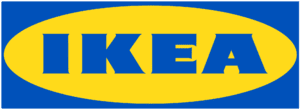 IKEA is known for its efficient supply chain when it comes to its flat-pack furniture. Now, the company is looking to modernize its food supply chain as well. IKEA announced that it is starting a digital overhaul of its food division in an effort to reduce costs and eliminate waste. The company is also looking to implement technology to connect hundreds of store operations that currently rely on paper and spreadsheets to track the flow of food. The new technology will allow receivers to flag suspect products and send a picture to the chef so they can make a decision on whether it can be used. The system will also tell the chef how many meatballs are on hand or frozen, and how long before they expire. It is certainly a big undertaking but given that food sales now account for nearly 5 percent of IKEA’s business, it is well worth the effort.
IKEA is known for its efficient supply chain when it comes to its flat-pack furniture. Now, the company is looking to modernize its food supply chain as well. IKEA announced that it is starting a digital overhaul of its food division in an effort to reduce costs and eliminate waste. The company is also looking to implement technology to connect hundreds of store operations that currently rely on paper and spreadsheets to track the flow of food. The new technology will allow receivers to flag suspect products and send a picture to the chef so they can make a decision on whether it can be used. The system will also tell the chef how many meatballs are on hand or frozen, and how long before they expire. It is certainly a big undertaking but given that food sales now account for nearly 5 percent of IKEA’s business, it is well worth the effort.
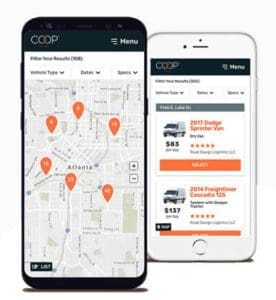 Ryder System Inc. announced that it will expand its ride-sharing program for trucks to meet growing demand. The program, which is named COOP, is a peer-to-peer truck-sharing platform that allows commercial vehicle owners to rent idle trucks and trailers to a network of trusted businesses. COOP will expand into the Dallas, TX area. The company sees the program as an Airbnb model, and recently launched a new mobile app and an on-demand liability insurance product. Ryder also said that the platform generates average monthly earnings of $3,000 for a single straight truck or $4,000 a month for a sleeper tractor. The company also said that more than 1,300 businesses have joined the program.
Ryder System Inc. announced that it will expand its ride-sharing program for trucks to meet growing demand. The program, which is named COOP, is a peer-to-peer truck-sharing platform that allows commercial vehicle owners to rent idle trucks and trailers to a network of trusted businesses. COOP will expand into the Dallas, TX area. The company sees the program as an Airbnb model, and recently launched a new mobile app and an on-demand liability insurance product. Ryder also said that the platform generates average monthly earnings of $3,000 for a single straight truck or $4,000 a month for a sleeper tractor. The company also said that more than 1,300 businesses have joined the program.
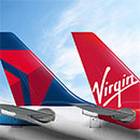 Virgin Atlantic Cargo has joined the longstanding Trans-Atlantic air cargo joint venture between Air France-KLM Cargo and Delta Air Lines Cargo. This creates an expanded partnership representing 23 percent of total Trans-Atlantic air cargo capacity. The carriers said that with the addition of Virgin Atlantic Cargo, the carriers were “promising cargo customers more connections, greater shipment routing flexibility, improved trucking options, aligned services and innovative digital solutions with the launch of their expanded transatlantic joint venture (JV).” The venture gives customers a choice of 110 nonstop routes with onward connections to 238 cities in North America, 98 in Continental Europe. and 16 in the UK.
Virgin Atlantic Cargo has joined the longstanding Trans-Atlantic air cargo joint venture between Air France-KLM Cargo and Delta Air Lines Cargo. This creates an expanded partnership representing 23 percent of total Trans-Atlantic air cargo capacity. The carriers said that with the addition of Virgin Atlantic Cargo, the carriers were “promising cargo customers more connections, greater shipment routing flexibility, improved trucking options, aligned services and innovative digital solutions with the launch of their expanded transatlantic joint venture (JV).” The venture gives customers a choice of 110 nonstop routes with onward connections to 238 cities in North America, 98 in Continental Europe. and 16 in the UK.
 Coronavirus has been taking its toll on the global supply chain. As the virus threatens long-term disruptions, sixteen Chinese ports and port groups have started to offer exemptions and reductions in port charges. With ports and industries shut down for the Chinese New Year, the threat from coronavirus could extend shutdowns and force a reduction in port calls. To alleviate the strain, the ports are waiving certain port fees. The 16 ports include Guangzhou port, Shanghai Port, Ningbo-Zhoushan port, Jiangsu port group, Shandong port, Tianjin port, Fuzhou port, Zhuhai port, Wuhan port, Xiamen port, Chongqing port, Zhanjiang port, Liaoning port group, Hebei port group, Beibu Gulf port group, and Anhui port group.
Coronavirus has been taking its toll on the global supply chain. As the virus threatens long-term disruptions, sixteen Chinese ports and port groups have started to offer exemptions and reductions in port charges. With ports and industries shut down for the Chinese New Year, the threat from coronavirus could extend shutdowns and force a reduction in port calls. To alleviate the strain, the ports are waiving certain port fees. The 16 ports include Guangzhou port, Shanghai Port, Ningbo-Zhoushan port, Jiangsu port group, Shandong port, Tianjin port, Fuzhou port, Zhuhai port, Wuhan port, Xiamen port, Chongqing port, Zhanjiang port, Liaoning port group, Hebei port group, Beibu Gulf port group, and Anhui port group.
 And finally, the state of Georgia is planning a nation-wide first: truck only interstate lanes. The Georgia Department of Transportation (GDOT) has plans to develop unique new truck-only lanes between McDonough and Macon along Interstate 75 that will be the first of its kind in the nation. The 40-mile-long-barrier-separated lanes are estimated to cost about $1.8 billion to construct and should be open in 2028. Funding for the truck-only lanes was approved by the Georgia General Assembly’s $11 billion Major Mobility Investment Program in 2015. According to estimates, the new truck only lanes could reduce delays for truck traffic by about 40 percent on I-75 north in 2030. According to GDOT, there are no tolls planned for the truck-only lanes.
And finally, the state of Georgia is planning a nation-wide first: truck only interstate lanes. The Georgia Department of Transportation (GDOT) has plans to develop unique new truck-only lanes between McDonough and Macon along Interstate 75 that will be the first of its kind in the nation. The 40-mile-long-barrier-separated lanes are estimated to cost about $1.8 billion to construct and should be open in 2028. Funding for the truck-only lanes was approved by the Georgia General Assembly’s $11 billion Major Mobility Investment Program in 2015. According to estimates, the new truck only lanes could reduce delays for truck traffic by about 40 percent on I-75 north in 2030. According to GDOT, there are no tolls planned for the truck-only lanes.
That’s all for this week. Enjoy the weekend and the song of the week, Soundgarden’s Burden in my Hand.

















